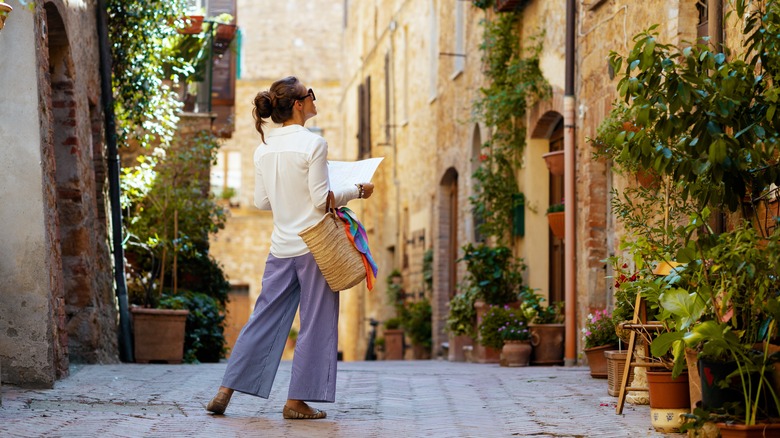Rick Steves Explains Why US Italian Restaurants Can't Compete With The Ones In Italy
The U.S. has some stellar Italian restaurants, many of them run by Italian immigrants who understand the complexity and nuances of the cuisine. But despite their best efforts, says Rick Steves, U.S. Italian restaurants still fall short of their counterparts in Italy in a few different ways. One is simply the quality of ingredients in Italy vs. those in the States. Take tomatoes: An American tomato is the pale, cardboard cousin of the southern Italian pomodoro, which is so juicy and flavorful that it's clear why a whole genre of Italian food revolves around it.
At a Tuscan trattoria, Steves practically ascends into Dante's Paradiso after an olfactory encounter with a heavenly ingredient, in this case, a block of aged pecorino. He writes, "The dank, rustic smell took my mind straight to an agriturismo barn I had visited, where random rays of sun cut between the weathered boards, filtered by floating dust from the hay, and bathed the sheep in a timeless Tuscan light." The experience was so intoxicating that Steves says the very next day, he returned to the restaurant to inhale more cheese.
The U.S. produces a few foodstuffs that may cross over into this divine territory — Georgia peaches, for example, or the American hops in superb craft beers. However, Italy hits it out of the ballpark every single time with its produce, cheeses, olive oil, pastas, cured meats, and seafood. The list is endless, whether you're in Tuscany. Rome, or a lesser-known region like Umbria.
It's all about the ambience
According to Steves, another thing that distinguishes eateries in Italy from their U.S. imitators is the dining ambience, which is almost impossible to artificially replicate. Restaurants in the U.S. may hire high-end architects and interior designers to perfect every detail of the layout and décor. But even the highest-paid feng shui consultant cannot infuse the interior of an American building with the vitality and warmth you'll find in eateries across Italy.
This comes in part from the restaurant patrons themselves, who have been schooled in la dolce vita (the sweet life) since entering this world as infants. In Italy, diners are not rushed. They do not make a zillion requests of the waitstaff to accommodate dietary preferences. They are "in the moment" rather than absorbed in their cell phones. Of course, it helps that many medieval buildings that house restaurants in Italy often lack cell phone reception, Steves wisecracks.
Additionally, in Italy, a restaurant's owner's personality punctuates this ambience and "keeps the energy right." Owners emit a palpable warmth when they make appearances in the dining room (which they often do) to welcome and chat with the guests. By doing so, they act as human explanation points to the overall conviviality of the establishment.
The prelude to the meal
The third thing that makes restaurant experiences in Italy unique is the pre-dining affairs, which set the stage for the meal. Steves explains the potency of this prelude in his blog: "the terroir of actually eating after the foreplay of a day in Tuscany is something you can't get anywhere but here." This is true of Tuscany and countless other locations around Italy that are so hauntingly beautiful they are like a triple caffeine jolt for your senses.
Taking an evening passeggiata (or stroll) through an Italian village is a hedonistic feast. The medieval architecture stimulates the imagination, the warm breeze caresses the skin, and the whir of cicadas fills the air, as does the aroma of herbs, flowers, and baking bread. After days like these, the body and mind are perfectly primed for an incredible meal. These antecedents are harder to come by in a bustling city or suburb in the States. To experience the sheer magic of Italian restaurants for yourself, consider a food tour in Bologna (which many regard as Italy's culinary capital) or another city or region. While the basic themes remain the same, each region of Italy has its own unique take on the inimitable Italian dining experience.


